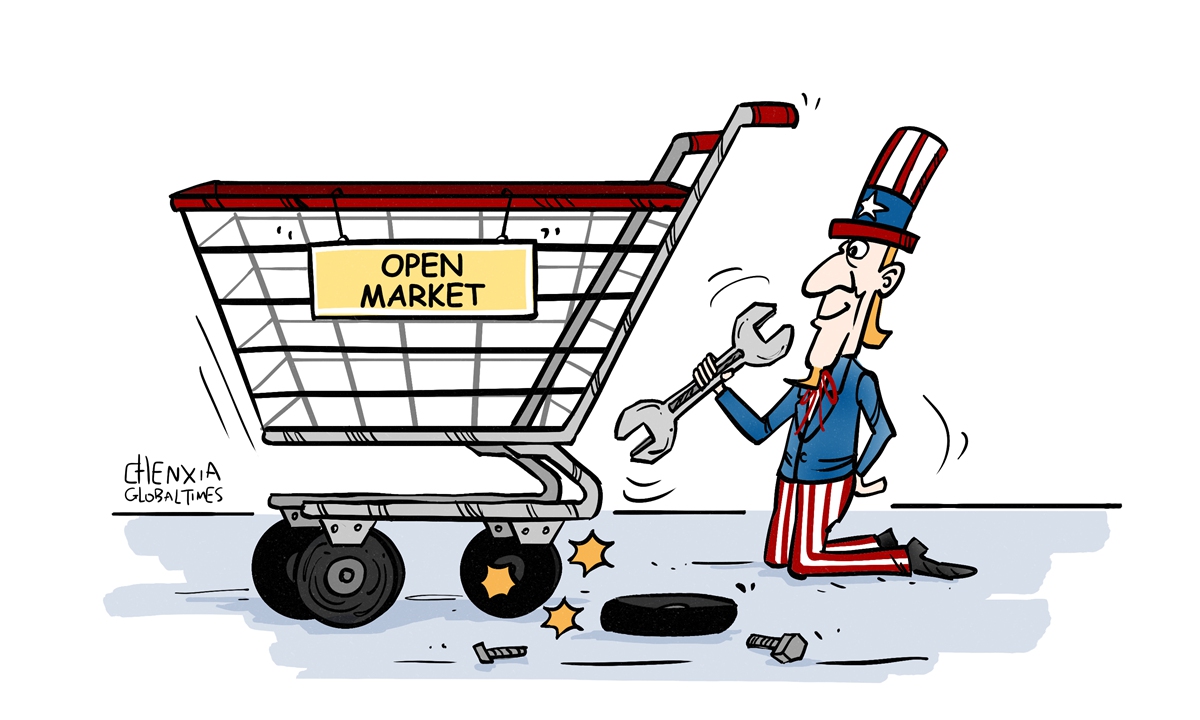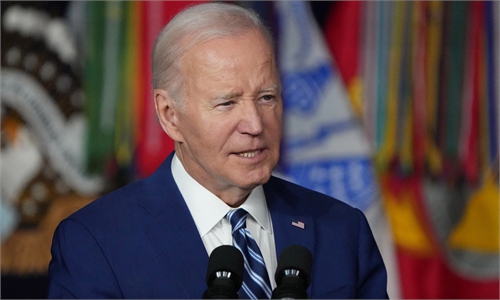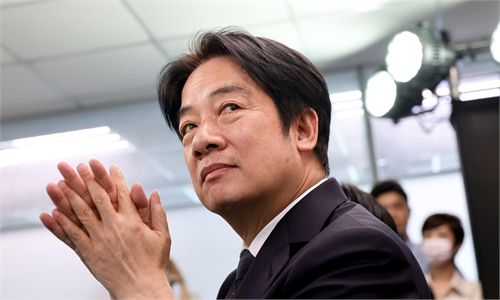
Illustration: Chen Xia/Global Times
US President Joe Biden launched another technology battle front with China by signing an executive order on Wednesday that will block and regulate American outbound investments directed toward Chinese high-tech companies. The order covers advanced semiconductor chips, micro-electronics, quantum computing systems and artificial intelligence, with the purpose aimed at stifling China's economic growth.The order fully illustrates the bare-knuckled attempt by the Biden administration to squeeze and stymie China's high-tech sector development, after witnessing China's meteoric advances in many high-tech lines in the past decade, particularly in ultrafast mobile broadband connections and applications, quantum communications, space explorations, high-end robotics and AI research and innovation.
The US government, adopting an increasing protectionist approach, seems to have completely veered off the normal track of free trade and globalization. Biden's economic policies have accelerated the deconstruction of globalization, which many economists said is self-defeating by depriving American economy of the benefits of globalization as globalization provides a variety of product and service choices at competitive prices.
And, Washington's habitual condescension and intentional coercion of China is implicit in this new action, as if the US is yet able to nip the development of 1.4 billion people who have constructed the world's longest high-speed railway system, rolled out the most advanced 5G network, and sold about 60 percent of the world's electric vehicles on a sprawling land of 9.6 million square kilometers.
It is known to the world that the US government's assault on Chinese high-tech enterprises is unrelenting in order to sustain its technology supremacy and global hegemony. Biden's National Security Advisor Jake Sullivan put it in black and white, saying the US has adopted an approach called "small yard, high fence" to thwart China's modernization drive. Although American politicians have been spinning that they still seek to maintain normal and workable ties with China, what they have actually done is deconstructing and poisoning the relationship.
The new limits imposed on high-tech investment in China added to the export control measure on advanced semiconductor chips, which was announced by the White House in October, following Trump administration's ruthless attack on Huawei Technologies. The cascade of accelerations in technology combats has significantly fuelled geopolitical tensions between the world's two largest economies.
Some US government officials claim that the new investment restriction stemmed from the need to ensure "America's own national security goals" rather than strangling China's tech ambitions - which has been rebutted by Chinese experts as a "pure lie." Even American businessmen say Washington's new restrictions have gone too far, inhibiting their normal business operations in China. As a matter of fact, the broad US investors, the venture capital and private equity investors in particular, bemoan that they should not get entangled in Biden's political zero-sum game.
During meetings with senior Biden administration officials in Washington last month, Intel CEO Patrick Gelsinger, Nvidia CEO Jensen Huang, and Qualcomm CEO Cristiano Amon warned that if the US government continues to control the exports of semiconductor chips to China, the world's largest market, it will inevitably harm the US dominance in the high-tech sector. Obviously, the White House bid to erect "high fence" around its technology "yard" will backfire and hurt America.
At the same time, the fundamental economic interests of its allies, including the Netherlands, Japan and South Korea which the US has persuaded to suspend semiconductor cooperation with China, will be impaired too as their companies are losing China's huge market. All the more, any complicit efforts aimed at suppressing and strangling China's growth are illegitimate and won't be condoned by Chinese people.
And, many in global media outlets are suspicious of the White House's intentions. The Biden administration officials have insisted that they have no interest in "decoupling" from China, yet the US has controlled the export of advanced semiconductor chips, sought to limit investments into China, and maintained the expanded tariffs levied on Chinese goods first set up by Trump. The purpose is to impede China's tech rise and contain China's economy, which is crystal clear for all to see.
For many years, globalization and integration have helped raise growth rates and pull tens of millions of people out of poverty. Now, anti-globalization and economic fragmentation spearheaded by the US' "decoupling" or "de-risking" gambit is eating away at the fruitful results of globalization, which is leading to a divided world. The path to regaining robust growth looks increasingly rough and foggy, as the ropes that hold the countries together are becoming weaker and more breakable.
Protectionism, or closed-door isolationism, is a failed and outdated concept. Washington's efforts to levy high tariffs on Chinese goods, ban high-end chips export to China, or to impose investment restrictions on China's high-tech companies, are all protectionist acts which have torpedoed globalization and international free trade, causing severely disrupted supply chains, and an increasingly fragmented world.
Blinded by their ideological bias against China, Biden administration officials have abandoned conventional economic theories by creating a narrative that globalization and efficiency "are not good" and should give way to "well-protected jobs at home" through "decoupling," which is categorically wrong. For centuries, the market has been left to decide how to deploy labor, technology and capital in the broad belief that efficiency and growth should override protectionism. But the US government, nervous about China's growing industrial competency, is turning its back on open markets, free trade and globalization. In essence, politicians in Washington fear they will lose out to China in free and unfettered competition.
The persisting inflation imperiling the developed economies in the past two years is the result of Biden administration's anti-globalization gambit, because trade and investment protectionism inevitably leads to lower efficiency and higher prices, which has been vindicated by the elevated inflation and economic downturns in the US, the UK, Germany, Japan, South Korea and other developed economies. If these countries refuse to change course and readjust their misaligned policies, more economic pain could be lurking around the corner.
The author is an editor with the Global Times. bizopinion@globaltimes.com.cn



